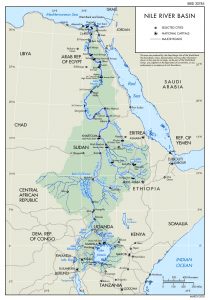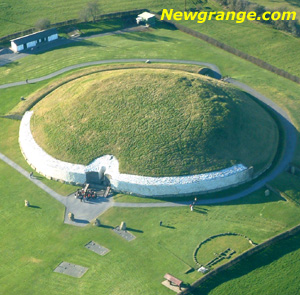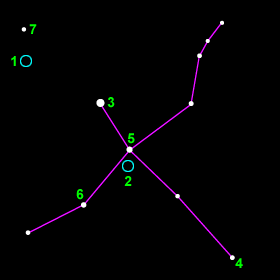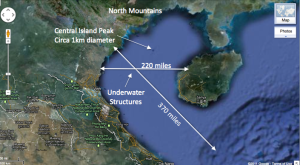Derek Cunningham
Nile River *
 The River Nile was considered the longest river in the world, a title now disputed by the Amazon.(a) More important was the part it played in the development of pharoanic Egypt. Understandably, it also played a part in the mythology and religion of ancient Egypt.
The River Nile was considered the longest river in the world, a title now disputed by the Amazon.(a) More important was the part it played in the development of pharoanic Egypt. Understandably, it also played a part in the mythology and religion of ancient Egypt.
In 2019 a paper(d) by Larry Pahl, who looked again at the Orion Correlation Theory and concluded that Robert Bauval should not have confined his theory to Orion’s ‘belt’, but looked at the entire constellation and sought a more extensive reflection on the monuments of ancient Egypt. Prahl then proceeds to do exactly that.
Similarly, Jean-Pierre Lacroix claimed that other Egyptian structures may have been located to reflect the layout of other constellations in the sky. Specifically, he focuses on Aries and Thebes(e) .
Alessandro Berio went further with the claim(f) that the entire Nile was ‘designed’ to be a reflection of the constellations above!
Philip Coppens commenting on how the Incas viewed the valley of Cusco wrote “Modern research suggests that the Sacred Valley of the Vilcamayu and Urubamba rivers symbolised the Milky Way. Identifying rivers with constellations, specifically the Milky Way, is nothing new. Other examples are the Nile, as well as the Po in Italy and the Rhône in France.”(b)
Derek Cunningham claims to have discovered(c) that there is an association between the layout of the Stonehenge complex with the Milky Way!
(a) Nile – Wikipedia
(b) Viracocha’s voyage – Eye Of The Psychic
(c) https://atlantipedia.ie/samples/archive-3055/
(d) https://www.academia.edu/41868838/Expanding_the_Orion_Correlation_Theory_OCT_
Newgrange
Newgrange is a Neolithic monument in Ireland’s Boyne Valley, County Meath. It was constructed around 3,200 BC, which makes it older than Stonehenge and the Pyramids of Giza. Newgrange is a large circular mound 85m (279ft) in diameter and 13m (43ft) high with a 19m (63ft) stone passageway and chambers inside. The mound is ringed by 97 large kerbstones, some of which are engraved with megalithic art.
Newgrange was built by a farming community that prospered on the rich lands of the Boyne Valley. Nearby are Knowth and Dowth which are similar mounds that together with Newgrange have been designated a World Heritage Site by UNESCO(a).
 The site was fully investigated and reconstructed between 1962 and 1975. However, the reconstruction was not accepted without criticism(h).
The site was fully investigated and reconstructed between 1962 and 1975. However, the reconstruction was not accepted without criticism(h).
>>In 1980, Martin Brennan (1942-2023) an Irish-American researcher, “whose research work and books in the 1980’s changed how we look at the sophistication of Ireland’s Stone Age monuments. Martin challenged conventional opinion about the function of Newgrange, Dowth, Loughcrew and other passage tombs of Ireland and presented overwhelming evidence showing that many of these 5,000 year old monuments were used as astronomical observatories. His books, The Boyne Valley Vision [2104] and The Stones of Time (The Stars and the Stones [2105]), both published in the 1980s, have stood the test of time.”(l)<<
Both Robert Hensey(f), who has studied and written about Newgrange [1766.6] and Mike Parker Pearson, Stonehenge’s leading authority, have endorsed the idea of a French origin for megalith building(g).
Bob Quinn visited the enormous stone circle at Mzora in Morocco and was struck by its similarity to Newgrange(e)!
Newgrange is best known for the illumination of its passage and chamber by the winter solstice sun. Above the entrance to the passage at Newgrange, there is an opening called a roof-box. This baffling orifice held a great surprise for those who unearthed it. Its purpose is to allow sunlight to penetrate the chamber on the shortest days of the year, around December 21st, the winter solstice.
Like all ancient monuments, the Boyne Valley cluster has generated its collection of wild speculation, such as Freddy Silva’s claim that there is a connection between Knowth and Sacsayhuaman near Cuzco in Peru and who also hints at a possible link with Egypt’s Osirion(b)!
The unaccredited Keystone University in Ireland published a video in 2020 in which it claimed that “the neolithic tomb at Newgrange in the Boyne Valley is, in fact, the famed temple of Atlantis and one of the oldest temples on earth as a result(i).” This daft claim is a development of Ulf Erlingsson‘s theories published in 2004.
The winter solstice event is not the only astronomical link proposed for Newgrange. Anthony Murphy and Richard Moore have written(c) about the Cygnus Constellation and a possible link with Newgrange [1441]. Paul Dunbavin also touched on the possible connection between swans in Irish mythology and astronomical events(d).
>>Andrew Collins has also written [075] on the place of the constellation Cygnus in prehistoric consciousness. Arising from this study, it appears that the position of the Cygnus stars correlates more accurately with the Giza pyramids than those of Orion, which was proposed some years ago by Robert Bauval. Collins continues with the Cygnus-Giza connection in a subsequent offering, Beneath the Pyramids [0631]. Derek Cunningham has echoed(m) some of Collins’ work suggesting that there existed in ancient times a World Map based on the Cygnus constellation! Collins has also suggested that a suspected Black Hole in Cygnus Constellation is thought to be the source of cosmic rays that changed evolution and kick-started religion(n)!<<
Even more unlikely is the suggestion from E. A. James Swagger in The Newgrange Sirius Mystery [1683] in which the author endeavoured to link Ireland’s most important megalithic site with both an early understanding of precession and the symbology of the Dogon.
Furthermore, the imaginative Frank Joseph has speculated that “the early date for Newgrange, its circular construction, sophisticated solar orientation and mythic tradition all point to Atlantean origins.” [0636.70]
A common feature of most of the great megalithic monuments, such as Stonehenge, The Maltese Temples or Newgrange is the incorporation of astronomical alignments into their design. Recent years have seen the development of archaeoacoustics and the study of the sound characteristics of various ancient structures. Arguably the most famous site is the Hal Saflieni Hypogeum in Malta, about which Linda Eneix has written an interesting paper(j). She notes that there is a suggestion that sounds there, and possibly elsewhere, might lead to a release of the ‘feel-good’ hormone dopamine. Any inference that this was a deliberate design feature will require evidence. Eneix just touches on Newgrange acoustics that are discussed elsewhere(k).
(a) https://www.knowth.com/newgrange.htm
(c) https://www.third-millennium.co.uk/irishgodkings
(d) Mythical Ireland | Astronomy | The Cygnus Enigma (archive.org)
(e) http://heritageaction.wordpress.com/2011/01/27/the-mysterious-moroccan-megalithic-menhirs-of-mzora/ (see last comment)
(h) https://www.knowth.com/excavation.htm
(i) The Lost City of Atlantis is Ireland (irishcentral.com)
(j) https://www.academia.edu/63669239/Megaliths_Music_and_the_Mind_The_Latest_in_Archaeoacoustics
(l) https://www.knowth.com/martin_brennan.htm *
Cygnus Constellation, The
The Cygnus Constellation was the location of a supernova that inspired the story of Phaeton, as related to Solon by the priests at Sais, according to Michael A. Cahill in his two-volume Paradise Rediscovered [818/9].
 Andrew Collins has also written[075] on the place of the constellation Cygnus in prehistoric consciousness. Arising from this study, it appears that the position of the Cygnus stars correlates more accurately with the Giza pyramids than those of Orion, which was proposed some years ago by Robert Bauval. Collins continues with the Cygnus-Giza connection in a subsequent offering, Beneath the Pyramids[0631]. Derek Cunningham has echoed(a) some of Collins’ work suggesting that there existed in ancient times a World Map based on the Cygnus constellation!
Andrew Collins has also written[075] on the place of the constellation Cygnus in prehistoric consciousness. Arising from this study, it appears that the position of the Cygnus stars correlates more accurately with the Giza pyramids than those of Orion, which was proposed some years ago by Robert Bauval. Collins continues with the Cygnus-Giza connection in a subsequent offering, Beneath the Pyramids[0631]. Derek Cunningham has echoed(a) some of Collins’ work suggesting that there existed in ancient times a World Map based on the Cygnus constellation!
Collins has also suggested that a suspected Black Hole in Cygnus Constellation is thought to be the source of cosmic rays that changed evolution and kick-started religion(d)!
Anthony Murphy and Richard Moore have also written(b) about the Cygnus Constellation and a possible link with Ireland’s Newgrange[1441].>This idea was echoed in a recent episode of Ancient Aliens (S18E17)(f).<Paul Dunbavin also touched on the possible connection between swans in Irish mythology and astronomical events(e).
Freddy Silva has endeavoured to link Cygnus with the Osirion in Abydos in a 2019 article(c) in which he dated the structure to 10,500 BC.
(a) https://www.midnightsciencejournal.com/?s=Cygnus
(b) Mythical Ireland | Astronomy | The Cygnus Enigma (archive.org) *
(c) https://invisibletemple.com/extra/osirion-link-to-cygnus-10,500BC.html
(e) https://www.third-millennium.co.uk/irishgodkings
(f) Review of Ancient Aliens S18E17: “The Shining Ones” – JASON COLAVITO *
Cunningham, Derek
Derek Cunningham is the author of a website(a) with an extensive amount of material devoted to archaeoastronomy. His core idea is that there existed in ancient times a World Map based on the the Cygnus constellation, echoing some of Andrew Collins’ work[075].
Included on his site is an article that somehow links a painting, allegedly a map, in the Lascaux Cave with a location in Viet Nam’s Gulf of Tonkin, which Cunningham describes as having “dimensions and geographical features similar to Plato’s description of Atlantis.” He later adds that “of all the various locations proposed, this is the only site that appears consistent with Plato’s description.” As a layman I found the article and the site in general, totally confusing, forcing me to lie down in a darkened room.
However, I cannot deny that Cunningham has put a lot of work into his site and he does have fans(b), but his ideas are too ‘way out’ for me.
His most recent ‘discoveries’(c) include an association of the layout of the Stonehenge complex with the Milky Way!
Cunningham has published his theories in two books, Khyung The Stone Age Astronaut[954] and 400,000 Years of Stone Age Science[955].
He later extended his studies to the remarkable terraced walls of Sacsayhuamán near Cuzco in Peru. In a 2014 illustrated article in Popular Archaeology online magazine, he claimed that the angles of the adjoining ends or sides of the irregular yet tightly fitting stones have astronomical significance!
Cunningham, has now turned his attention to angles inscribed at ancient sites, which he now claims can be associated with astronomical features and events. His extensive article(e) on the Migration and Diffusion website deals with a great many numbers that I shall leave others to evaluate.
(a) See: https://www.midnightsciencejournal.com
(b) https://thothistheibis.wordpress.com/tag/brodgar-complex/
(c) See: https://atlantipedia.ie/samples/archive-3055/
(e) https://www.migration-diffusion.info/article.php?year=2016&id=486


